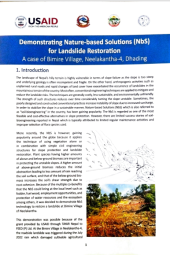Demonstrating Nature-based Solutions (Nbs) for Landslide Restoration: A case of Bimire Village, Neelakantha-4, Dhading
Summary
This document provides a brief on the case of Bimire Village demonstrating nature-based solutions for landslide restoration.
The hilly terrain of Nepal is susceptible to slope failure due to steep slopes and fragile underlying geology, aggravated by anthropogenic activities like unplanned roads. Conventional engineering methods to mitigate landslides are costly, unsustainable, and environmentally harmful. NbS, also known as "soil-bioengineering," emerges as a cost-effective and eco-friendly alternative. NbS involves using vegetation, particularly species with significant above and below-ground biomass, to stabilize slopes. Despite limited success stories in Nepal, NbS is gaining global popularity. This approach was demonstrated in Bimire Village, Neelakantha, where a landslide in July 2022 damaged agricultural land and posed risks to infrastructure and homes. The demonstration, funded by USAID through TAYAR Nepal to FEED (P) Ltd., showcased the potential of NbS in landslide restoration, offering local benefits such as fodder, fuel wood, employment, and water resource protection.
Categories:
Factsheets
Publisher:
FEED
Published Year:
2022
